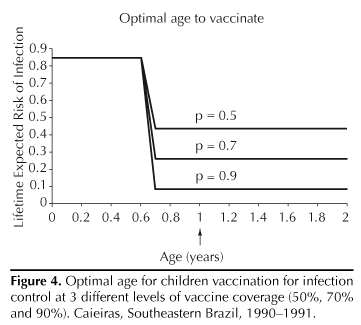OBJECTIVE: To analyze the prevalence of IgG antibodies to human parvovirus B19. METHODS: Cross-sectional study in a suburban community in São Paulo, Southeastern Brazil, between November 1990 and January 1991. Randomly selected (N=435) representative samples of sera were collected from healthy children older than 15 days old and adults up to 40 years old. IgG antibodies were detected using ELISA. RESULTS: High prevalence of IgG antibodies to B19 parvovirus was found in 87% of newborns. The prevalence of maternally derived IgG antibodies exponentially plunged up to the 19th month of age. Low prevalence of antibodies was found in the first 4 years of life, increasing up to 72% in those aged 31-40 years. It was estimated that the average age of first infection in this population is 21 ± 7 years old and the optimal age for vaccination with a hypothetical vaccine would be 1 year of age. CONCLUSIONS: Parvovirus B19 IgG antibody prevalence was high in newborns and those aged 31-40 years. The analysis by age groups showed a pattern similar to that found in previous studies, i.e., low prevalence of infection in children that increases with age.
Parvoviridae Infections; Parvovirus B19, Human; Risk Groups; Seroepidemiologic Studies














